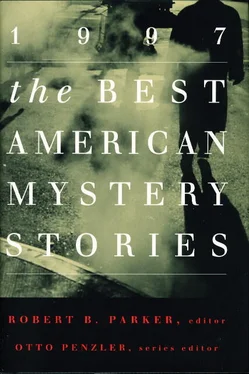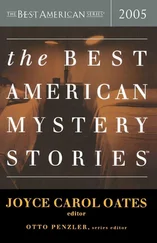Fashioned out of some sort of blue shell, the earrings had a graceful, bell-like shape and a thin lattice of gold around the bottom curve. Displayed alone on a tray of black velvet, they were heartbreakingly beautiful. And because they were beautiful I wanted them badly. I let my brother buy them for me; I understood that he was not buying them to make up for the cost of my meeting him but because he too was taken with their beauty and he too — on that crisp fall day amid scores of ordinary people and bright storefronts and soulful dogs tied temporarily to lampposts — was seized, unexpectedly, by hope.
“Remember that big shell we found one time at Silver’s Beach?” my brother said to me.
“No,” I said. The earrings were on, I could feel their pearly shine. I felt decorated, cleansed, acquainted once again with beauty.
“Don’t you?” he insisted, a lilt creeping into his voice. We stepped into the street, which was calm now, mostly empty. It was late. We’d been together for hours. “I’m talking about the little cove at the end, near the Crosbys’ camp,” he said.
“I’m sorry,” I told him, though of course I did remember: the most vivid pink shell, huge and heavy, planted there by my father, who was given to grand gestures. But it belonged in the part of our life that no longer existed.
“It was pink,” he said, but he’d lost heart. He pulled out another cigarette and held it between his ragged fingers.
We arrived at my car, and he opened the door to let me fill the front seat with the delicate pastel bags. I wondered whether a passerby would know that here was a man two weeks out of prison, staring into the hole that was the rest of his life.
“Do you think we might, I don’t know, get together again?” my brother said. He stamped out another cigarette. “What do you say, Meg?”
“We’ll see,” I told him. “I don’t know.”
“Meg,” he said. His hands went to his pockets and he held his elbows tight against his body. “Meg, it was only that one time—”
“Oh,” I whispered. “Please. God.” All this time he had left me with the smallest hope, and in a word it was gone. I was weeping like a child, for the part of me I’d held in reserve, for him, had cracked open and joined the muddy slide of my heart.
He contorted his scarred, prisoner’s face. “Meg, I’m so sorry.”
“Don’t.” I put up my hands as if to defend myself.
“I’m not drinking anymore, if that means anything to you.”
“It doesn’t.”
“Meg, if there was any way—”
“The only way is to undo it,” I said. My voice was nearly gone. “That’s the only way,” I said again. “Undo it.”
I said it as if I believed he could. He hugged me hard then, knocking me off balance, and I might have let out a small cry of alarm — I think I remember seeing a man on the sidewalk stop and turn — but I recovered before falling and then he was off, lurching across the street like a fugitive. I watched him get smaller and smaller, until he finally turned a corner and disappeared.
When I pulled into my driveway, I sat in the dusk for a while, looking into the lighted windows of my house. Brent was already home, in his favorite chair in the den, and Jenny was moving back and forth in the kitchen, getting herself a snack. They were in different rooms, but something about their proximity was companionable, as if they’d been conversing through the doorway. Jenny was taller than she had been back then — a college girl now — and more graceful, though a certain furtiveness had crept into her carriage, a suspicion that I didn’t remember from before. I got out of the car and circled the house, stopping to stuff my packages in the trash, then came in the side door, through the kitchen. Jenny’s eyes — the wide-set, greenish eyes of my brother — moved from my face, to the earrings, and back again.
“You saw him, didn’t you,” she said. She stood at the counter, watching me over her shoulder, her palms flat down as if someone had hired her to guard the food.
Brent appeared then, folding his reading glasses, squinting in my direction. “Saw who?” he asked.
They had become strangers to whom I was irrevocably tied. We might have survived a train wreck or witnessed a murder, unable to meet each other again without evoking a physical memory. Our intimacy was an awkwardness we endured without naming, and it had erased the simple fact of mother-father-daughter that had once defined us.
My hand, of its own accord, went to my left ear.
“He gave you those, didn’t he,” Jenny said.
“Christ,” Brent muttered. “I knew it.”
It look me a long time to get them off. On one of the earrings especially, the post was a snug fit, and I had to work at it for a few moments before my family’s unforgiving eye — the polished shell no doubt spewing little sparks of light all the while I could have told them I didn’t say your name. I didn’t say his. For my family, however, betrayal was not a matter of degree.
I told them later that I threw the earrings out, flung them in a fit of remorse into the scrubby stand of trees at the far end of our yard. This was a lie, not my first. I kept them in my purse for days, and later moved them to the back of my top dresser drawer, rolled into a pair of cast-off gym socks, then I hid them again, and it has been long enough now that I can’t say for sure where they are, only that they are somewhere in this house, two blue shells wrapped in a rustle of tissue. I hid them understanding that I would not show them or wear them or look at them ever again but would know, at times exactly like this, that they exist somewhere in all their original beauty, hidden but not altogether gone from this world.
Born and raised in Northern Michigan. Doug Allynmajored in criminal psychology at the University of Michigan, served in military intelligence during the Vietnam War, and parlayed those credentials into a twenty-five-year career as a rock guitarist.
Since 1986 Mr. Allyn has published five mystery novels and fifty short stories. He has won, or been nominated for, every major literary award in his field, including the Edgar Award for 1995.
Mr. Allyn and his wife live in chaotic bliss in Montrose. Michigan.
• Some years ago I read an Aldous Huxley novel. Point, Counterpoint , in which Huxley structured his plot around the classical musical form of the fugue. I was attracted by the idea of transmuting elements of music into prose, but borrowing the structure of a work is a bit like breaking into a jewelry store to heist a display case. If you’re going to steal something, why not filch the elements that actually empower music: passion and dynamics?
The story “Blind Lemon” is an attempt to do exactly that.
I can only hope it’s half as effective as the performances of the original Blind Lemon Jefferson were.
James Crumleylives in Missoula. Montana. Since taking an M.F.A. at the University of Iowa, he has crisscrossed America as an academic tramp, published one collection of short pieces. The Muddy Fork, and six novels, most recently Bordersnakes. His work has been published in a number of foreign languages and awarded a Pushcart Prize and the 1993 Hammett Award.
• I hadn’t written a short story since 1972 and had never written one about crime when Otto Penzler asked me to contribute one to his Murder for Love collection. Aside from the fact that my imagination doesn’t seem to lend itself to the short story form, I discovered once again that the little devils are hard as hell to write. Alter a dozen false starts, I went over to Mike and Eve Art’s Chico Hot Springs Lodge, planning a week floating the Yellowstone River trying to catch the brown trout fall run. It’s Montana, right, and October is often the finest month. Of course it snowed like crazy. So I spent the week in a cabin on a bench watching the weather work the Paradise Valley — snow and freezing rain, occasional shafts of sunlight exposing the peaks through the low clouds, and steam curling off the hot spring pool. Somehow I was reminded of a story I had once tried to write while living in Mexico, started with that woman’s dreams, layered with the scenery outside the window, memories of the Ozarks, football notions, and poker games. After more drafts than I care to remember, the result was “Hot Springs.” Crime seldom pays, love seldom works. Thankfully stories, like fishing, occasionally work. In ways unexplainable.
Читать дальше












